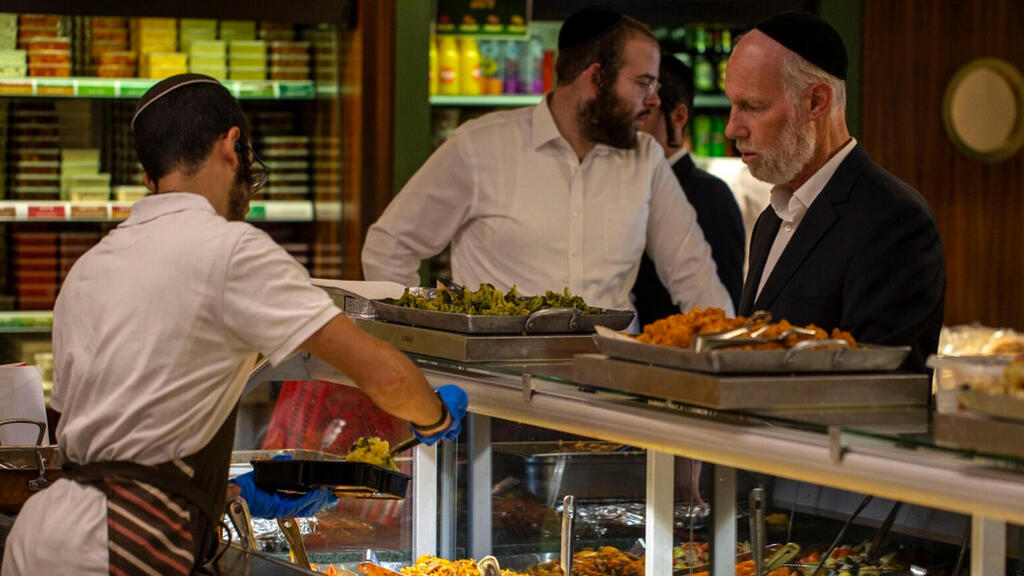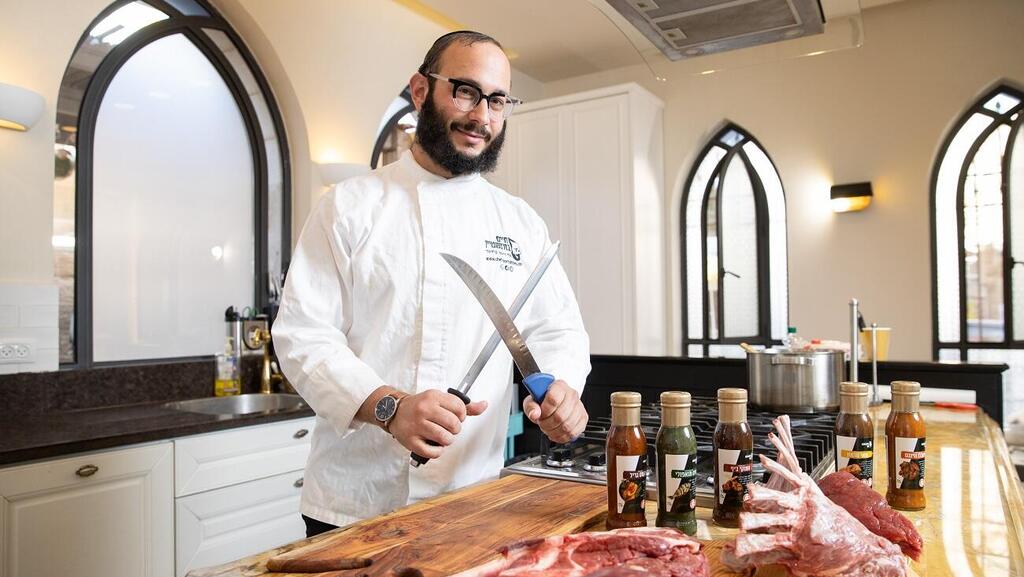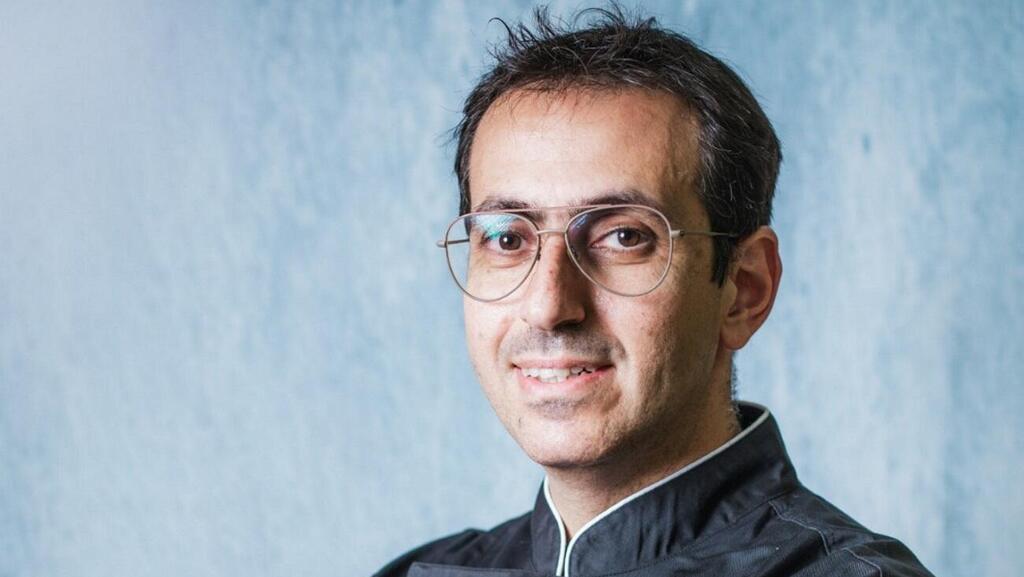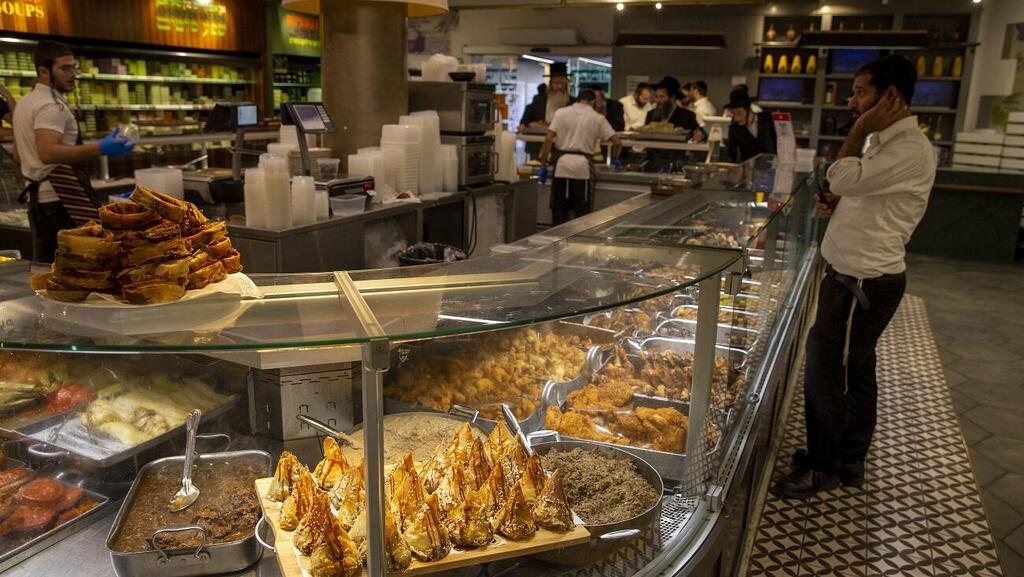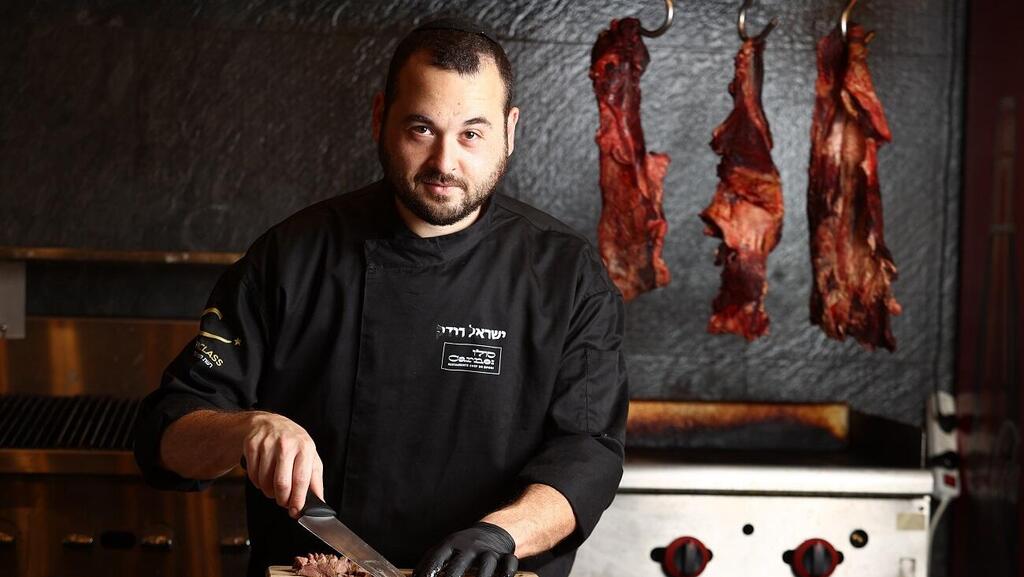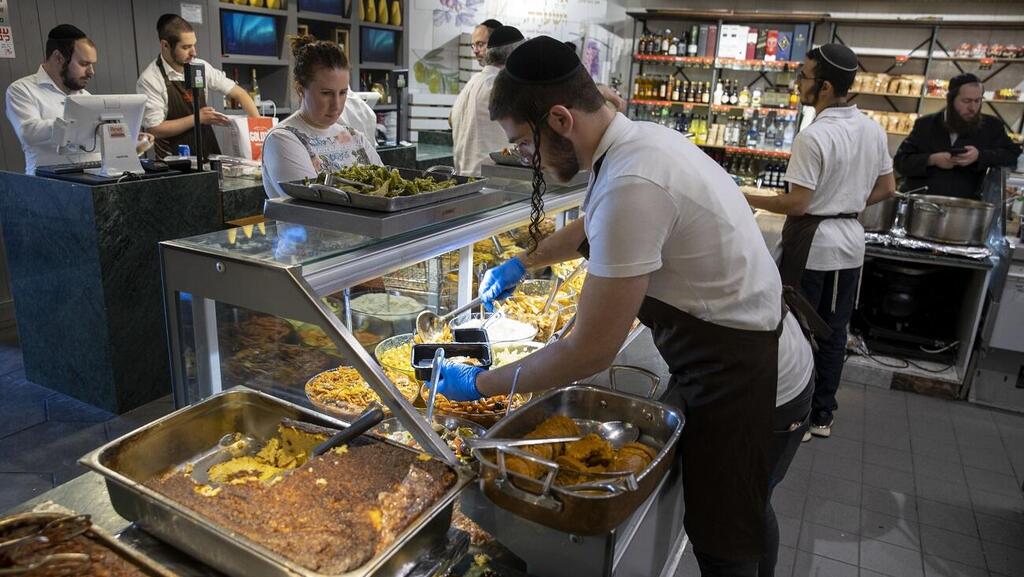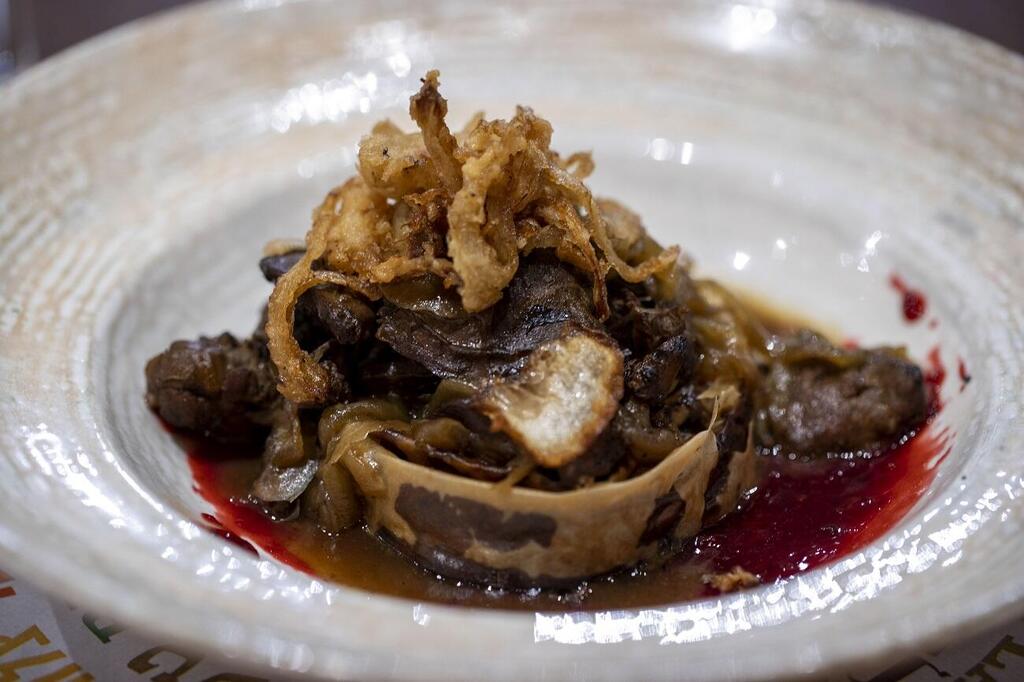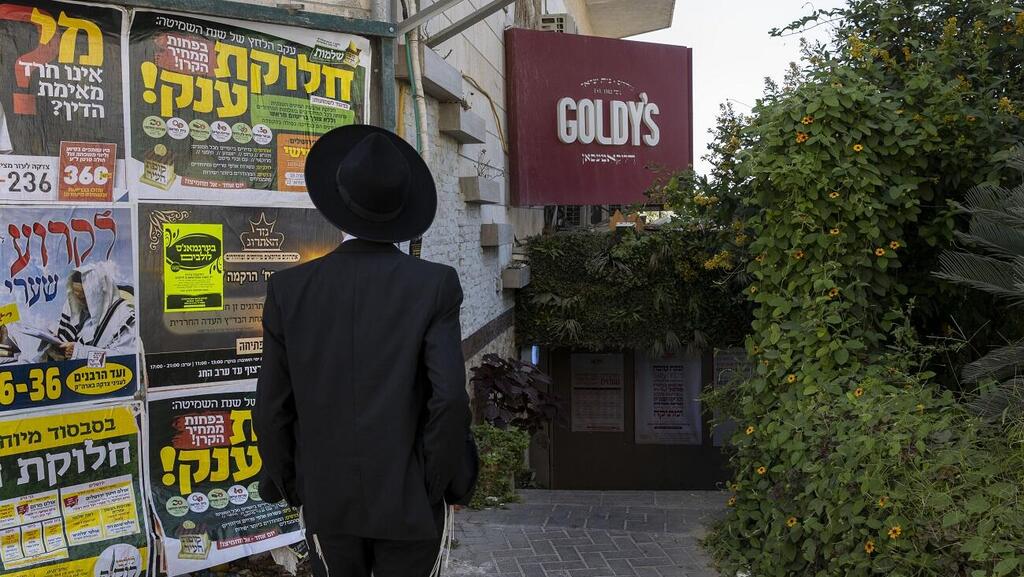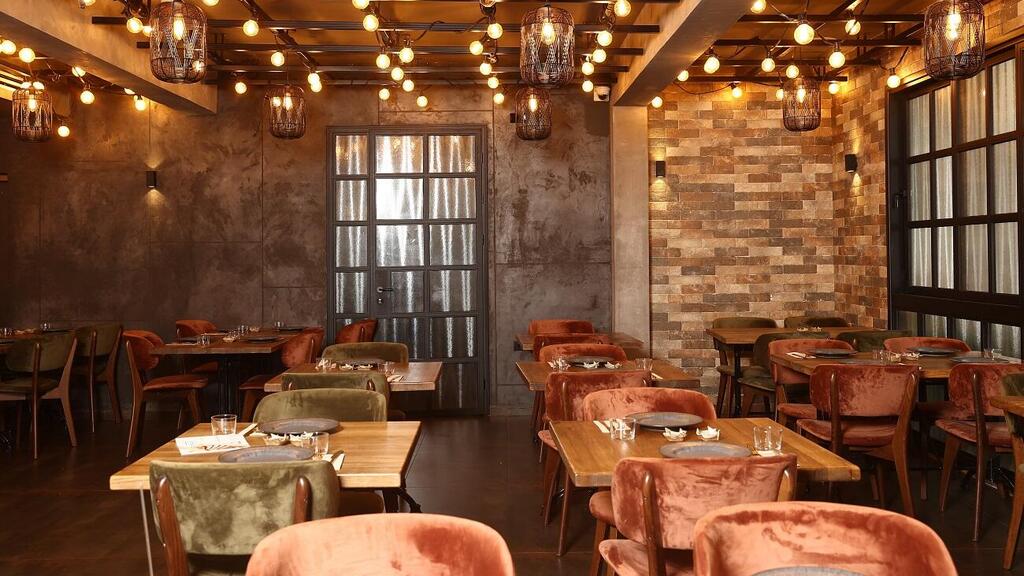Getting your Trinity Audio player ready...
Haim Bornstein, a private ultra-Orthodox chef, is facing the challenge of transforming gefilte fish – a Jewish dish of patties made of ground fish – into a plat du jour that one day could be worthy of a MICHELIN star.
“A few months ago, a Haredi couple hired me to cook for them as part of a luxurious trip to a trip they were taking to celebrate the husband’s 50th birthday,” Bornstein says. “After presenting the wife with the special menu, she told me her husband always wants to eat gefilte fish on Fridays. No exceptions.”
“I thought to myself it was odd. For an expensive meal, costing NIS 5,000, and with food items that included lamb and sweetbread, I didn’t expect gefilte fish to also be on the menu. But the wife insisted, and I had to get to work.”
Bornstein then turned to his mother for help in preparing the special dish. “I don’t dare making gefilte fish on my own because I’ll never be able to compete with my mom,” he says.
He then cut up the patties into slices which he wrapped with carrots, and topped with chrain (a spicy paste made of grated horseradish) and mayonnaise. “I had to explain to them that the dish was in fact gefilte fish, since the two didn’t understand it at first. The husband told me he never saw a gefilte fish being served like that, and we were all happy with it.”
Bornstein said that preparing gefilte fish as part of an elite meal would’ve never happened five years ago. But according to him, a culinary revolution in the Haredi world is underway, and the community is hungry for more ‘premium’ foods without the need to compromise their religious beliefs to enjoy it.
“People want the p'tcha and chopped liver served in a MICHELIN-type way,” Bornstein says. This culinary revolution in the sector includes an increase in purchasing food from catering services and placing grocery orders online. This trend became very prominent during the recent Jewish High Holy Days.
Big Haredi families who host their relatives for traditional holiday meals were buying catering options to help the women in the families with the burden of having to cook for a large crowd of people.
Moshe Kashoki is the head chef of “Goldy’s” - one of the biggest Haredi catering services in business. Prior to the eve of Yom Kippur, he spent a full 24 hours in the kitchen in order to fulfill all the orders. “This is the most difficult time of the year,” he says.
Kashoki is a secular Jewish man living in the central Israeli city of Hod Hasharon. “Sukkot is the biggest holiday for hosting families in the Haredi sector. A big part of the demand comes from American Jews coming to Jerusalem during the Jewish High Holy Days. The number of orders goes up 300% in the holiday months compared to regular seasons.”
Dudi Dror, head of the "Askaria," a polling company that specializes in the Haredi society, said the trend of ordering food rather than cooking is indeed on the rise. “The scale of demand isn’t as large as in the secular Israeli sector, but it is rising significantly in the Haredi community,” Dror says.
“This can also be seen in the opening of more culinary workshops, as well as in the way Haredi people experience food – friends who want to have fun together order a private chef to cook for them at home. More Haredi people than ever before are also dining out.” Dror adds.
Askria surveyed the eating habits in the Haredi sector over the month of July. According to Dror, “17% of people have spent over NIS 500 on dining out, and 23% spent between 201 to 500 NIS.” Meaning, 40% of of people in the sector spend considerable amount of money on eating out.
On of the major factors for this increase is that members of the sector, including women, are being integrated into the high-tech and other prestigious industries. This both raised the income of each family, and introduced different eating habits. Less and less Haredi workers bring mehadrin kosher meals they prepare at home, to their workplaces. Companies tend to order kosher food for their Haredi employees, and they even eat out at kosher cafes, something which was considered unorthodox in the past.
The predominantly ultra-Orthodox city of Bnei Brak until this year had no high-end kosher restaurants - unlike Jerusalem, Beit Shemesh and other cities with a big Haredi community. This year, several such restaurants have opened in Bnei Brak’s new shopping center called the BBC (Bnei Brak Business Center), including “Hachashmonaim 7” and “Concord Boutique,” with more set to open soon.
Bnei Brak’s new center is made up of 15 high-rise buildings, with six more being built. Chef Haim Cohen is one of those opening high-end kosher restaurants in the central city. What is unusual about this soon-to-be opened eatery is that the restaurant will not be mehadrin kosher.
“I believe there’s a big audience, which will be satisfied with the restaurant being just kosher and not mehadrin kosher. The restaurant won’t serve meat, we’ll make pasta and fish,” Cohen says. "The restaurant will be small in size, serving 50 people inside and 20 outside."
Haredi chef Israel Dudek has also recently opened his first restaurant meant for the Haredi crowd, called ‘Solo Carne’. “I see crowds in my restaurant that I have never thought I would meet. The most religious groups.”
When asked why he decided to open his restaurant specifically in Bnei Brak, Dudek says: “you should come here at 3pm to see the amount of people arriving here, then you’ll understand.”
Some 300,000 people are working in Bnei Brak’s new commercial center, with more planned to be recruited in the future. Gil Vardi, founder and head of the real-estate agency "Status," estimates that the number of workers will reach 40,000-45,000 after more high-rise buildings are built in the complex, and that restaurants are working to attract the Haredi workers, whose numbers is only set to increase.
“A lot of businesses came here from Ramat Gan, Tel Aviv and Petah Tikvah, and restaurants are becoming kosher while maintaining the culinary standards of cities like Tel Aviv, Vardi says.
However, he is under no illusion and understands that profits from eateries opening in Bnei Brak will not be as high as from secular commercial sectors. “The commercial space is expensive. Restaurants can’t exist solely on selling lunches, and there are no other stores to spend time in and browse after work, while businesses are also closed on weekends. Restaurants here have to be small and sufficient in order to survive.”
Chef Israel Dudek was born in a religious Hasidic family. “I wasn’t a good student in my yeshiva, and found myself wandering into kitchens,” he says. “My mom signed me up to a cooking competition, because there weren’t any male chefs back then. I met Miri Zorger there, who was the first Haredi chef who taught me that food is to be enjoyed, and was the first person who began the mehadrin kosher gourmet trend in Israel.”
Dudek then worked as Zorger’s sous-chef, and attended more culinary classes. He opened a cooking class for male chefs in the "Culinary Campus" - the largest Haredi cooking and baking school in Jerusalem. He left after a year and a half, and founded the "Haredi Culinary Association," which is considered to be the most active culinary association in Israel, numbering 160 members, 30 of whom are women.
The Haredi culinary world was dominated by women up until two years ago this has changed. According to Dudek: “There’s a change in the concept of the profession in the community.”
“When I was starting out, I would change clothes at my workplace’s bathroom to avoid being seen. Today my dad proudly says: 'My son is a chef.' It’s similar to what happened in the secular community, when parents hoped their children would become doctors of lawyers, but they became chefs. The change is coming to the Haredi sector as well.”
Chef Bornstein is the first Haredi chef to win a gold medal in Israel’s national gourmet cooking competition held in Tel Aviv in 2018.
Chef Bornstein is the first Haredi chef to win a gold medal in Israel’s national gourmet cooking competition held in Tel Aviv in 2018. Bornstein recently released kosher sauces and spice blends for cooking, for the Haredi community.
Bornstein defines himself as a private chef, working mainly for families arriving from aboard, and knows the developing Haredi taste well. “A Haredi man invited me to do catering for his event, and I was amazed with his culinary knowledge. He knew what spices to put on meat before smoking it, and the difference between carpaccio and sashimi.”
The culinary revolution isn’t exclusive to Bnei Brak. Recently, "Golda" – the ice-cream parlor chain which is also open on weekends – opened its first mehadrin kosher store in Beit Shemesh.
Golda’s ice-cream factory is also underway to becoming mehdarin kosher, which according to the company is a move made to reach more customers. Once the factory is fully kosher, each store would decide if it wants to become mehadrin kosher.
The Haredi bodies in charge of approving kosher certificates are also aware of the need to expand the variety of products offered to the Haredi community. “A few years ago, you could almost never find premium kosher meat. Today there are three boutique butcher shops in Jerusalem selling oxtail and lamb,” Bornstein says.
I visited the Goldy’s catering store in Jerusalem on the eve of Sukkot, and have never seen shopping carts so filled with food. “We have over 70 types of salads, 17 of them are eggplant-based, and 29 are fish- based,” chef Kashoki says. “It’s a changing culinary world. Cakes for example, used to be the simple chocolate crunch and rugelach. Today people want salted caramel and pistachios. We even sold a meat-filled doughnut.”
Goldy’s belongs to the Delicious group, who operates a catering kitchen in Ma’ale Adumim, and delivers food to Goldy’s, workplaces and schools, and also via an online website. Some 25% of the group’s sales for private individuals are processed online, and the group intends to capitalize on that fact following the opening of the second Goldy’s store in Bnei Brak, planned for December.
Aryeh Rosenstein, husband of Delicious CEO Naomi Rosenstein, is in charge of the group’s online activity, and says the group wants to increase its online presence. “We want our online activity to be bigger than our offline one.”
Goldy’s was founded in 1992 by chef Moshe Goldys under the name "House of Israel." In 2015, the Health Ministry’s food safety department ordered the store to stop selling salads and other items due to sanitary issues.
The affair ended with charges being pressed against then-Health Minister Yaakov Litzman, who was a customer of the store, saying he attempted to influence officials in the Health Ministry to reverse their decision. The store was then sold to its current owner, Yosef Haim Shasler, in 2016, who brought the Rosenstein couple into the business.
Naomi Rosenstein reorganized the business, and now has plans for another store in Bnei Brak, which will include over 700 types of food, including meat and fish, alongside a cafe and bakery - which will all be kosher. “We’ll invest NIS 7 million there, a catering service of this size was never seen in Israel, not in the secular or Haredi markets,” Naomi says.
She added that a secular European businessman asked Goldy’s to cater an event for the wedding of one of his two sons who had found religion and now lives in Jerusalem. He wanted for the wedding to feature both Haredi and secular foods, so he also hired chef Erez Komarovsky.
“The mixing between high-end Haredi and secular culinary cultures created an event which connected the two worlds,” Naomi says.
Avi Steinitz, one of Israel’s top chefs and culinary consultants, is a secular man who knowns the mehadrin kosher culinary world quite well. He has a popular recipe column he writes for one of Haredi newspapers. “The days of defining ‘gourmet’ and Haredi food as different are over,” he says.
“People realize today that falafel, shawarma or cholent can become gourmet when coked right. There are also chefs who grew up in the Haredi community and left it behind, like chef Efrat Libfroind.”
Libfroind is a popular Haredi baker, who is also a lecturer, a food magazine editor, and author of seven books which became popular even outside of Haredi circles. “I see my work as a mission,” she says. “I make people happy. I have many women who come from the Haredi community attend the courses I teach, and I get excited by the way they connect to secular women who also come to my classes.”
According to Steinitz: “The Haredi sector is exposed to social media, where food is prevalent, and so the cooking ways change as well. There’s kosher internet, Haredi WhatsApp and Facebook groups, and those who have access to them, pass their knowledge along.”
Some of these Facebook groups number in the thousands. The Facebook group “Datilishes” for example, has 72,000 members. According to Bornstein and Dudek, each of them has six to seven active WhatsApp groups, which only ever quiet down on Shabbat – talking about subjects ranging from recipes to selecting cutting knives.
This change is also seen in the increasing consumption of alcohol in the sector. “The largest number of the most expensive alcoholic beverages are now sold in Haredi stores,” Steinitz says.
Dudek also explains that he was shocked by the demand of cocktails in the sector, and that he had to hire his friend Shahar Dabach to teach him how to mix premium alcohols.
“Food is an important part of life in the Haredi community. According to Jewish tradition, you eat in good times and bad times,” Steinitz adds. “Shabbat is centered around food. In Rosh Hashana there are four meals to eat. Sukkot is about hosting others, with the focus being food. Weddings and bar mitzvahs are also events with plentiful feasts.”
According the Bornstein, “I believe one day a mehadrin kosher restaurant will have a MICHELIN star. It’ll take time until someone understands the sector is also worth examining, but it’ll happen.”


